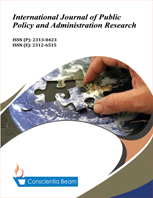Fiscal Reaction Functions and Public Debt Sustainability in Nigeria: An Error Correction Mechanism Approach
DOI:
https://doi.org/10.18488/journal.74.2019.62.116.132Abstract
The pervasiveness and persistent spiral of public debt in the country provide needed insights to determine the tendency for achieving sustainable debt. This, essentially, spurs the study to examine the responsiveness of Nigeria’s fiscal authorities to rising debt accumulation. As such, the study employs conventional unit root and cointegration approaches to estimate the fiscal reaction functions used in the study. Findings suggest that the existence of equilibrium relationship, in the models estimated, signals the fulfillment of the necessary condition for achieving debt sustainability. However, the sufficient condition for a sustainable public debt could not be met; this is evident in the negative response of government primary balances to changes in public debt in the long run. These findings readily affirm that government’s fiscal behaviour is not in tandem with the tenet of the intertemporal budget constraint as fiscal authorities could not generate enough surpluses in reaction to public debt increases. Therefore, there is threat to the feasibility of ensuring a sustainable public debt, importantly, as fiscal pressures and excesses still remain endemic issues. The study concludes that the fiscal operations of Nigerian government cannot sufficiently allow for a sustainable debt; hence, consistent running of this fiscal stance could either spur harsh adjustment measures in the long run or result to insolvency and default.

